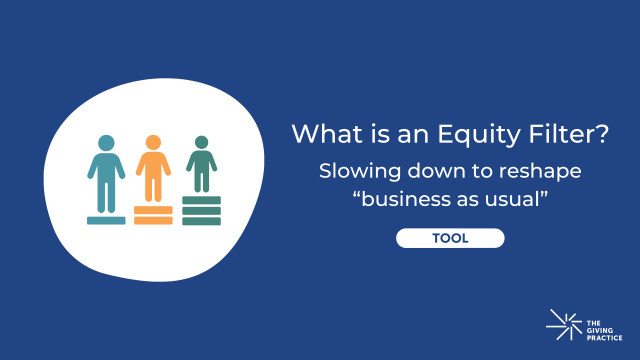
Sindhu Knotz and Jan Jaffe from The Giving Practice had a great conversation with Nikki Foster of Northwest Area Foundation about reflective practices she has used in a for profit organization and in philanthropy.
Jan Jaffe: What does the phrase reflective practice mean to you and when did you first become aware of it?
Nikki Foster: It’s the tools I use to think about my interactions with others and take myself out of the picture to authentically show up. Everyone probably uses some form of reflection for this purpose without naming it. There is no one size that fits all. But when you learn to acknowledge that is what you are doing, you have a stronger practice to work with.
Jan: I love your paradoxical spin on reflective practice! Would you unpack that a little more?
Nikki: We’ve all heard that during conversations, most people spend their time thinking of what they’re going to say next, not listening to what the other person is saying. When I find myself doing that, I try to refocus my thoughts and listen closely. I also remind myself that the objective of the conversation is to make sure we are moving toward our shared goal, not an outcome only I possess.
Jan: Can you identify how you learned to do this?
Nikki: When I was working in the banking industry, I was an Aspen Institute “First Mover” Fellow along with people from Google, Unilever, MasterCard and elsewhere to develop leadership skills that would help us achieve our social impact goals. One activity we learned was to read poetry, reflect on its meaning in small groups and talk about how it applied to our work challenges. The poems became metaphors we used to coach each other: “Remember to look for the mountains” to remind us to keep an eye on our big goals or “clap for sprouts” to celebrate the small things that are hard to achieve.
Reading, and even seeking out poems to match dilemmas and goals, helped me think about things at a much higher level and opened up new insights.
Sindhu Knotz: How about as a program officer at a foundation? Have you discovered other reflective practices?
Nikki: This work is hard and complex with challenges different than those I faced while employed at a for profit. I realized through Aspen that I am an introvert and that is where I get my energy. Finding the quiet space to just think and write out my feelings and thoughts is really important. It’s hard to feel that is a productive time, but it really is. At the foundation, it’s okay to sit in a conference room with a cup of tea to reflect and uncover lessons from our daily work. And planes! We work in 8 states and travel a lot. Lately, I try to use the plane time to read, journal, and think instead of opening my computer to answer emails or write reports.
I’ve been journaling in the last few years, but I’m not always sitting down with pen and paper. Sometimes I grab pictures or interactions from my Facebook and emails and paste them in my journal. I belong to an email-based poetry circle and taking even 10 minutes out of my week to read and reflect on a poem that has been shared sharpens my practice and exposes me to new ideas and questions.
Jan: I hear you saying that part of what you learned from the Aspen experience is to mobilize all your strengths and understand and manage your weaknesses to be more effective at work. How has that played out?
Nikki: One of the reasons I shifted to philanthropy from banking was the opportunity to bring my whole self to the work. I wanted to use what I’ve learned from my personal experiences as well as my professional training to contribute to better outcomes. Knowing how to examine my strengths and my weaknesses can lead to a significant shift in my work. For example, I’m super Type A. I was recently diagnosed with MS so it has forced me to organize my time differently to practice self-care and do what I can without overloading myself or others. Being Type A and introverted also means that wanting to use the right word all the time can hamper my ability to share.
Our communications director brought in a coach to help us tell stories about our work. I’ve been trying to use that as another practice to be effective. For example, I’m leading an initiative to build the capacity of African American-led organizations. I spent time thinking about how as a program officer and a white woman living in Minnesota what I could offer to connect with our grantees. I wanted to share my passion and perspective on why I care deeply about this effort. Early on, I was asked to be on a panel and shared my stories as part of a biracial family and from my past. My ancestors were part of the underground railroad in Illinois and left behind written stories about that part of our family history. What they wrote about their experiences made me ask: what narrative will I leave behind about my commitment to reducing disparities?
Another example is from a recent program retreat where we were trying to assess where we were in a long-time effort to get better at evaluation. In the middle, it can feel like we are getting nowhere but by reflecting about it, we were able to see that we have moved forward. We reviewed activities completed during the year and surfaced examples of when we used something we learned to quickly shift our approach. There were some genuine a-ha moments that day. To get to that point, we needed a dedicated period of time to talk openly with each other and as a team draws the parallels in our individual and collective work. Everyone has full plates and so committing to this time is critical to effectively reflecting together.
Sindhu: I love these stories about working together as a staff to reflect on practice. How about in your day-to-day work with grantees and grant applications? How have you found reflective practices help you do better work?
Nikki: This will sound counterintuitive but I try to take myself out of the picture by making the dynamic of what is going on more explicit.
Jan: I like that! Do you mean that you stay alert for possible ambiguities?
Nikki: It’s important to say from the start that a grant agreement is a point in time and there may be events that require us to revisit it. I want to be really clear so we don’t have a question about communicating in that messy middle. My assumption is that when you are upfront, it signals you trust your partner and that opens up the possibility of a two-way street.
Jan: It sounds like you try to remember that while you are doing something you care about deeply; the work is role-to-role. That’s a creative tension to hold!
Nikki: Talking about creative tensions, I learned from one of my colleagues that I used to jump into agendas too quickly. Especially in my interaction with Native communities. It is important to have time to establish a relationship and get to know each other. I was so appreciative of the feedback and the need to be thoughtful about the balance between the personal and the objective work.
I’ve slowed down, but I still prepare to deliver messages beforehand and anticipate what questions they might ask. In the moment, I name the reason I’m asking questions to be clear that I want to understand more so I can be more of an advocate. I work to read body language and read the room. When things don’t go well, I make a point of talking through difficult situations with colleagues, since they bring different perspectives even though we have shared values.
Finally, and most important, I try to always assume positive intent.
For more information about Reflective Practices, please click here.



